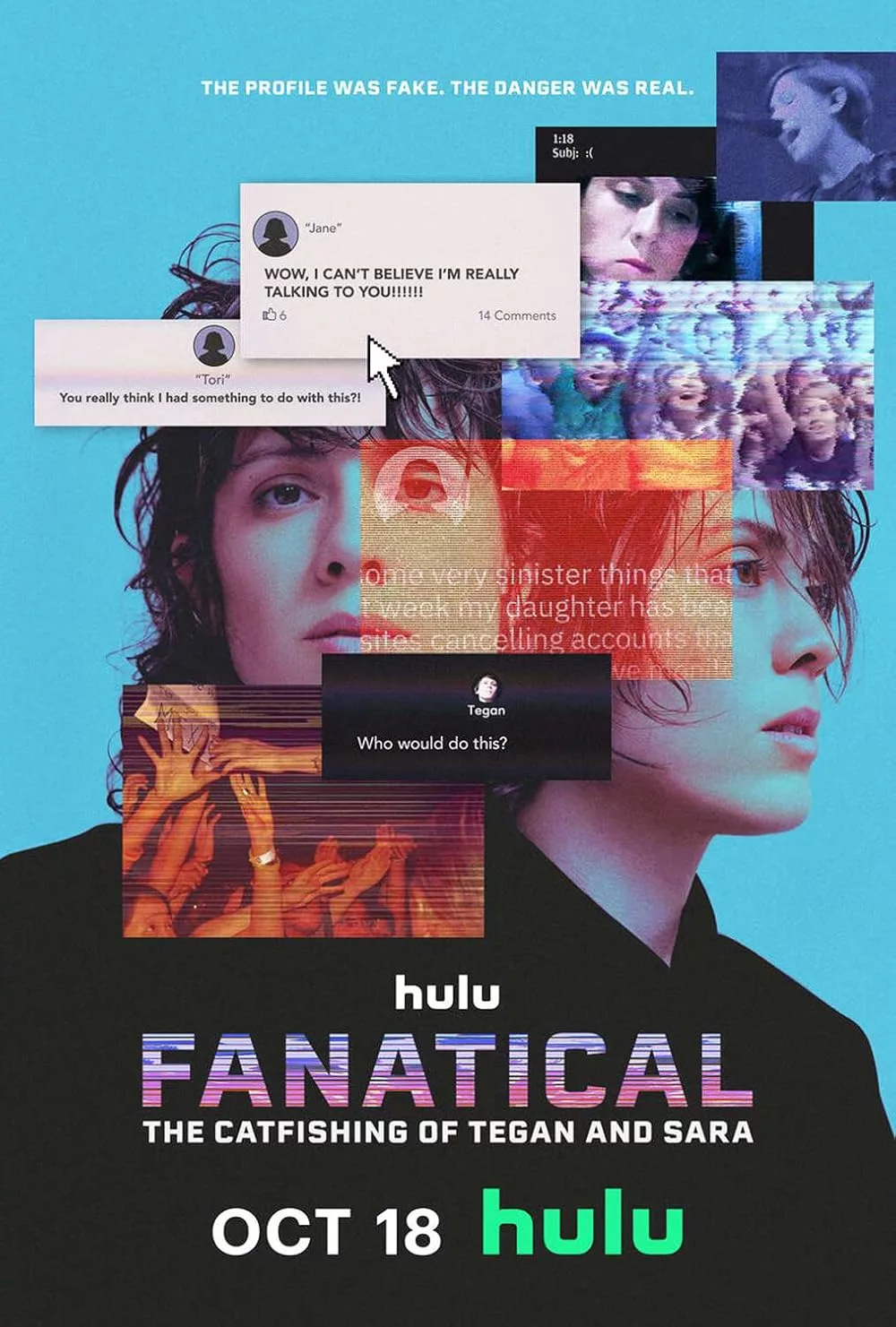Erin Lee Carr's documentary "Fanatical: The Catfishing of Tegan and Sara" tells the unique story of how fake online profiles of Tegan Quin, from the Canadian indie band Tegan and Sara, catfished many of their fans. But more crucially, the film uses that story as an avenue to explore how social media morphed from a space for fans to build community (and, in the case of queer people, a safe place to be themselves) into the toxic, parasocial fandoms we know today. It also acts as a time capsule for those of us who came of age in the early 2000s, with websites like Facebook and Twitter, LiveJournal, MySpace, Tumblr and even Last.FM playing pivotal roles in the scam. Unfortunately, its true crime format doesn't do justice to the complex human pain at the story's center.
While the film's title cites both Tegan and Sara, the focus is mainly on Tegan, whose online presence was faked by at least one culprit as early as 2008. Still, several nefarious persons engaged with fans as if they were the musicians themselves. As the doc begins, Tegan directly addresses their concerns about bringing this all back up, as it might stir up mixed emotions for them and their fans. As the film heads towards its visceral conclusion, we glimpse where this hesitation came from and the trauma that still lingers.
The investigation began in 2011 when Tegan and Sara finished two years of nearly non-stop touring. It was then that their management informed them that their social media and other private information had been hacked. Specifically, a fake Tegan, referred to in this doc as "Fegan," used fake social media and fake emails to engage in inappropriate relationships with the band's fans, and, in one incredibly painful case, an acquaintance from Tegan's early days in the Vancouver music scene.
The film then jumps around various timelines as we meet the superfans who were victims of "Fegan," as well as Tegan and Sara's management teams involved with the initial investigations into the incidents in 2011, and a social psychologist who explains the psychology behind catfishers. The conversations with the fans are particularly interesting in how they reveal how much these fandom spaces in the early 2000s meant to a lot of people, especially those who were young and/or queer at the time. Although I was never a big Tegan and Sara fan, I saw a lot of my early days on the Internet reflected in their confessions, as they spoke about meeting lifelong friends online through the shared love of something.
Tegan and Sara were pioneers in growing an online fanbase; when they first started, Tegan says, she would personally reply to every fan email at night when she got home from her day job. As the band grew bigger, Tegan would greet fans in line before shows, at the merch table after gigs, and even stand in line for hours signing autographs. The confessional style of the band's lyrics also stoked the illusion of openness that left them vulnerable to such fakery.
It's here that the film explores what it calls the "dehumanization" of pop culture figures, how one's love of something can lead towards a possessive attitude or even a vicious one. People of a certain age probably didn't need the prolonged explanation of where the term "stan" comes from but given that Eminem's song "Stan" will be twenty-five years old next year, perhaps it's good to remind people of its violent roots.
Towards the film's end, two confrontational moments don't land quite right. In one segment, the aforementioned acquaintance, referred to as JT, shares their story and how the aftermath of coming forward—and Tegan's coldness towards them—caused them to feel unsafe in queer spaces for a long time. "Vancouver is a small town. Music is a small town," JT says. Their trauma is still apparent, even in a staged scene where the two meet for the first time in over a decade. Tegan acknowledges that there is pain there but places the onus mostly on the wrath of "Fegan," not on her actions towards JT. This response is rooted in Tegan's trauma, but the way the film uses JT feels like a manipulation of a chess piece for the film's structure rather than any actual reconciliation.
The other sequence involves a toxic fan named "Tara," who once ran a blog writing "Quincest" fanfiction (readers, I apologize if this is the first time you are encountering the idea of twincest fanfiction, and if you are, you should probably not google the term further). During the film's investigation, "Tara" had the most connections to the other fans involved with "Fegan," as well as Tegan and Sara's management and even one of Tegan's exes. Tegan and director Erin Lee Carr film themselves during a call with "Tara," their voice altered, confronting them over their toxic past, and even go so far as to imply that they think "Tara" might be "Fegan." This, of course, does not go well.
The scene is an uncomfortable watch, but not for the reasons I think are intended. Sure, "Tara" has crossed boundaries. Their assertion that what happened to Tegan shouldn't have affected the singer because she is a celebrity illustrates how some fans cannot fathom that celebrities are human beings with real feelings, too. But it's also filmed in such an invasive way without any shred of self-awareness on the part of Tegan or the filmmakers of the power they have in this situation. This is strange when the entire film explores how catfishing is a way to gain power over others. Ultimately, Tegan and Carr agree that they think "Tara" is probably not "Fegan," but that's the only revelation they get from the encounter.
A postscript shares that "Fegan" exchanged over 2,000 messages with their victims over sixteen years, and the investigation into who perpetrated the crimes is still open. There is no closure. As the credits rolled, I wondered whether Tegan still questioned agreeing to this project and whether those fans who became victims felt it was worth opening back up about their experiences. Fandom is such a personal thing, and yet since Carr crafts the film with a clinical true crime lens, what it means for the fans to revisit all these intense feelings is left largely unexplored, simply, it seems, because they are not useful evidence for the investigation.
Despite making the case that celebrities are complex human beings just like the rest of us, this documentary lacks a human touch.




















